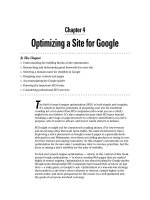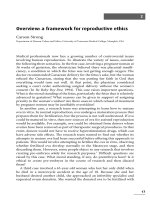There''''s a message for you ppsx
Bạn đang xem bản rút gọn của tài liệu. Xem và tải ngay bản đầy đủ của tài liệu tại đây (191.57 KB, 8 trang )
There's a message for you (Letter
Writing - Excuse Me, Sorry &
Pardon - Going To / Gunna - Kids
& Teenagers)
1. Viết thư - Letter Writing
Bắt đầu lá thư trang trọng với người chưa gặp bằng Dear
Dear
Please consider me for an interview.
I have excellent qualifications.
D luôn được viết hoa:
Dear
Please consider me for an interview.
I have excellent qualifications.
Nếu không biết tên của người bạn đang viết thư cho, viết
Sir or Madam
Dear Sir or Madam
Please consider me for an interview.
I have excellent qualifications.
Nhớ viết hoa S và D.
Dear Sir or Madam
Please consider me for an interview.
I have excellent qualifications.
Dùng tước vị trang trọng của người bạn đang viết thư cho:
Dear Mr Whittle
Please consider me for an interview.
I have excellent qualifications.
Khi viết thư xong, bạn viết Yours sincerely và tên bạn,
giống như sau:
Dear Mr Whittle
Please consider me for an interview.
I have excellent qualifications.
Yours sincerely,
Anne Lee
Thông thường ta viết Yours faithfully nếu bạn không biết
mình đang viết cho ai.
Dear Sir or Madam
Please consider me for an interview.
I have excellent qualifications.
Yours faithfully,
Anne Lee
2. XIN LỖI - EXCUSE ME, SORRY & PARDON
Nói excuse me để thu hút sự chú ý của ai đó:
Excuse me, do you know what time it is?
Excuse me, can we have the bill?
ANNE
Excuse me.
CLERK
I’m sorry Ms Lee. I didn’t see you.
Ta cũng nói excuse me để xin lỗi
Oh, excuse me. I spilled your drink.
Đây là một số cách khác để xin lỗi cho những việc nhỏ:
Oh, pardon me. I spilled your drink.
Oh, sorry. I spilled your drink.
Chúng ta trả lời như sau:
Oh, sorry. I spilled your drink.
That’s alright.
or
Oh, sorry. I spilled your drink
That’s okay.
Ta cũng dùng pardon và sorry nếu ta chưa nghe rõ
người nói nói gì, và muốn nghe lại lần nữa:
Nghe để thấy sự khác nhau.
pardon?
sorry?
Nếu không biết rõ người kia, hãy nói 1 cách trang trọng
hơn:
I beg your pardon?
3. GOING TO / GUNNA
Ta nói going to để cho người khác biết ta sẽ làm gì trong
tương lai.
I’m going to study next year.
Mọi người thường nói cụm từ nhanh, vì thế nghe nó giống
như gunna:
I’m gunna study next year.
ANNE
I’m going to cook a Chinese meal for you and your family.
4. TRẺ CON & THIẾU NIÊN - KIDS & TEENAGERS
Một từ thông thường dân dã hơn cho children là kids.
The kids go to bed at eight o’clock.
ANNE
You must have been there a hundred times.
STEVE
Not since I was a kid. It was great.
Trẻ con vừa biết đi được gọi là toddlers.
Things get more difficult with toddlers.
Trẻ lớn hơn, từ 13 đến 19 tuổi được gọi là teenagers.
Teenagers are very demanding.









